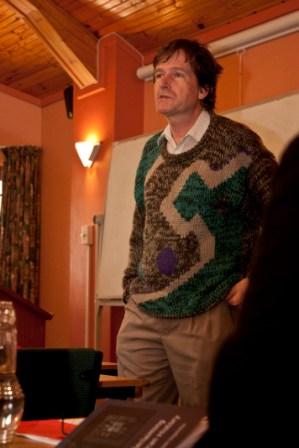
Dr Kirk Helliker, senior lecturer in Sociology Department at Rhodes University said the contemporary Zimbabwean experience provides interesting insight into the role and behavior of civil society organisations, running contrary to most prior conceptions.
Arguably the most internationally visible African country until the Arab Spring, due mainly to its radical land redistribution programme, started in 2000, Zimbabwe continues to be marked by polarising social conflicts.
According to Dr Helliker, over the past decade, Zimbabwean studies have been characterised by acrimonious debates about agrarian transformation and political change. “This has brought to the fore important questions about the significance and very existence of civil society as a social phenomenon in contemporary Zimbabwe, as well as raising key concerns about the conceptual framing of civil society under its specific socio-historical conditions.”
In his presentation entitled “Debunking civil society in Zimbabwe and ‘most of the world’”, Dr Helliker re-visited the notion of civil society in what scholar Partha Chatterjee (2004) calls ‘most of the world’ (beyond the capitalist metropoles) and, in so doing, used Zimbabwe and Africa more broadly as an entry point into the literature on civil society.
“Normally civil society is understood as a set of empirically-identifiable organisations, sometimes equated with non-governmental organisations, which struggle to bring about liberal democracy under conditions of state authoritarianism or to defend liberal democracy once established.
In this sense, civil society organisations are regularly if not invariably seen as progressive,” he said. However, the Zimbabwean experience provides a different side of the story. The land reform movement from the year 2000 brought about significant agrarian transformation leading to massive land redistribution to small-scale farmers.
“Urban civics campaigning against the ZANU-PF government condemned the land reform movement, and development NGOs refused to work within the new redistributed farms because of donor pressure,” he said.
As such, the land movement was un-civil in the sense of going against property relations and against market-led land reform, but it broke the back of white agricultural property owners in the country. “Such un-civil practices, within the domain of what scholar Partha Chatterjee calls ‘political society’, therefore seem to have the potential to transform society significantly, whereas civil society politics is normally reformist.”
This seems to have significance for South Africa, he said, as civil society organisations in South Africa are largely professionalised organisations dependent on donors who rarely call for fundamental change or act in radical ways. According to Dr Helliker, they may at times subordinate and undercut un-civil-type social movements and therefore de-mobilise communities.
“It seems that if we are to think emancipatory politics in South Africa then we need to think about the emancipatory potentials latent in un-civil society, such as certain shack dwellers movements and unemployed peoples movements in various urban centres, and to be led in a sense from the voices and dreams emanating from un-civil spaces. This could likely lead to questioning the effectiveness of parliamentary politics and civil politics in bringing about a more just and equal society in South Africa.”
Dr Helliker was hosted by the Departments of Politics and International Studies and Sociology’s 2012 Critical Studies Seminar Series.
By Sarah-Jane Bradfield
Picture by Ettione Ferreira
